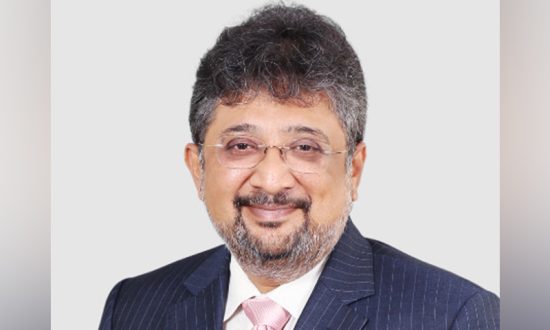Venkatraman Gopalakrishan is the Chief Executive Officer (CEO) of TVS Credit Services. With a career spanning over 32 years in the field of financial services, Mr. Venkatraman has emerged to become one of India’s most influential leaders in the banking sector. He was recently awarded with ‘Asia’s Promising Business Leader’ at the 6th edition of the ‘Asian Business Leaders Conclave’ by The Economic Times.
Ever since economic liberalisation started reaping dividends and private enterprises capitalized upon the opportunity of a more open economy, the industry has often complained about the lack of employable graduates. Data backs this claim till date. As per India Skills Report 2021, India has a 45.9% employability rate, which essentially means that for every two graduates, one is underprepared for the job market.
There is an alternative reality that one has to consider. In response to industry grievances, academia would usually put forth its challenges. There are just not enough resources, infrastructure, and most importantly programs, platforms, and opportunities for the Universities to guide students and provide exposure and training to students. In the vastness of India, which has perhaps the world’s biggest university student population, coming from diverse socioeconomic and cultural backgrounds, it is a mammoth task for bootstrapped Universities to provide the kind of rigorous exposure and training to prepare students for corporates and industries.
The Government also realizes the challenge. In its 2019 study, The Framework of Industry-University Linkage in Research, the Ministry of Science and Technology observed the absence of clear policies to facilitate strong co-operation between industry and academia.
Industry and academic partnerships are imperative, and it is happening now at a larger scale. Universities are increasingly adding more corporate leaders in their faculty to educate students with experiences and examples that are more relatable and rooted on the ground. Corporate leadership is not merely visiting their alma mater or, occasionally, being invited to colleges as a Guest Lecturer. You have company CEOs, directors, and vertical heads actually teaching a subject of their choice, leading unique programs or overseeing establishment of R&D and learning facilities or verticals.
The industry is investing into honing the young minds in colleges. IT giants like Microsoft have reportedly partnered with 10 reputed higher-education institutions to launch AI digital labs – a technology space of tremendous potential but with only few learning centres in the country. This initiative is beyond the CSR initiatives of the company and the objective is clear – to create a future-ready workforce in the country.
Similarly, a campus challenge programme E.P.i.C (Enrich, Perform, Innovate, Challenge), launched by a leading NBFC, TVS Credit, is offering college students, a unique platform to compete and provide solutions to real-life challenges including the cause of financial inclusion. The annual program, which has been operational for the past three years, witnessed a massive participation of more than 34,000 students from 2000 renowned colleges last year.
The program focuses on four core areas: Information Technology, Strategy, Analytics, and Finance. It aims at empowering students by helping them gauge their technical and problem-solving skills. Additionally, it provides opportunities to interact with industry leadership and management gurus, opens ways for internship and training, and mentorship from experts in the industry.
Additionally, initiatives like E.P.i.C are fantastic platforms for students and colleges to showcase their potential and are great avenues for enterprises for scouting talent. Over the past three seasons, E.P.iC. has attracted a large number of exceptional candidates and has become a pipeline for recruiting quality talent.
The program also became the foundation for signing of important industry academia collaborations. Both IIM Trichy and IIT Madras have signed MoU with TVS Credit to create seamless ecosystems between industries, academia and government agencies by leveraging analytics and technology. The pacts aim to boost innovation, R&D, and collaboration for designing new solutions for promoting financial inclusion in the country as well as to provide solutions in the space of Fintech and Data Sciences. Such ecosystems create a win-win situation for both the industry and the academia.
Organisations from various sectors are forming differentiated partnerships, like Taylor and Francis Group, the renowned publishing house, collaborating with IIT Madras Robert Bosch Centre. Such collaborations are based on well-documented success stories such as that of Boeing Technical Externship program in IIT-Kanpur or that of the partnership between National Institute of Technology Karnataka and Bosch.
The growing partnership and collaboration between the industry and academia is steadily changing the education and R&D landscape in the country. It is a change which has taken some time to come. But increasingly, there are unique collaborations between the two which are creating a winning situation for the students.
This transformation was coming for some time now, which is reflected in the fact that while India ranked between 43 and 49 from 2014 to 2016, the period between 2016 and 2019 witnessed an impressive improvement as we jumped to the 23rd spot in the Global Ranking of University/Industry Research Collaboration.
The concerted effort from the industry and academia is boosting problem-solving and creative thinking capabilities in students, infusing them with confidence, and offering them with unmatched exposure and opportunities. Through these partnerships, while the academia is able to provide better learning atmosphere to students and the industry gets its skilled-trained workforce, the ultimate winners are the students and the future of the country.


